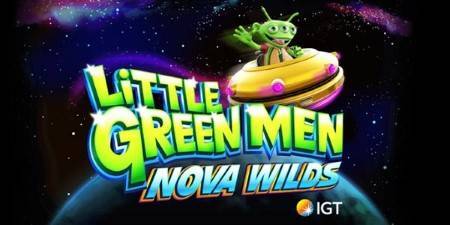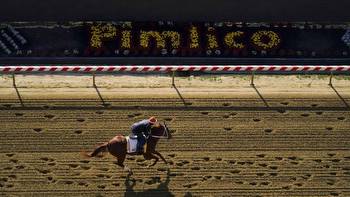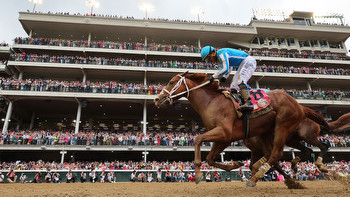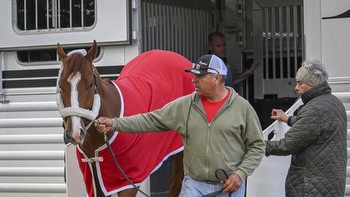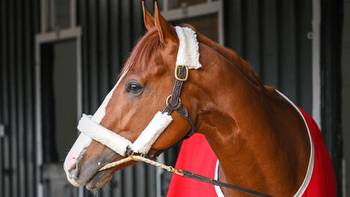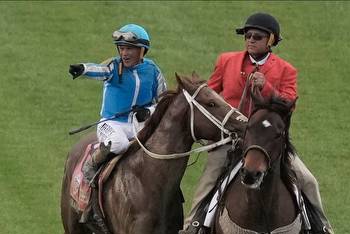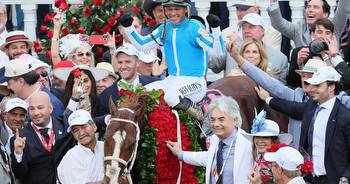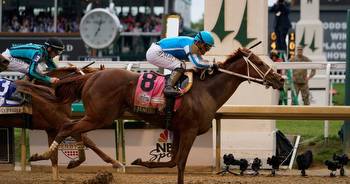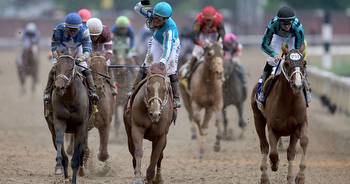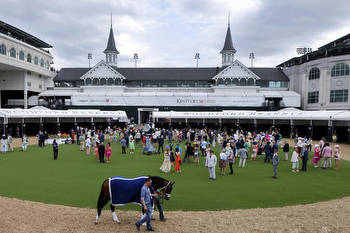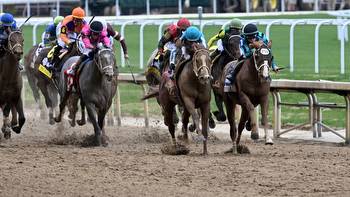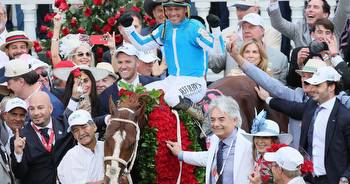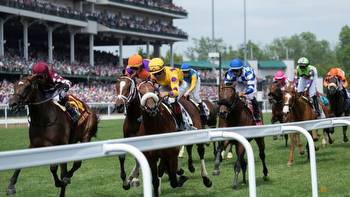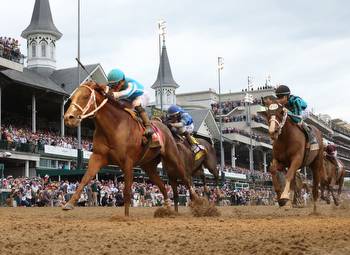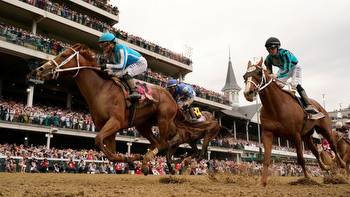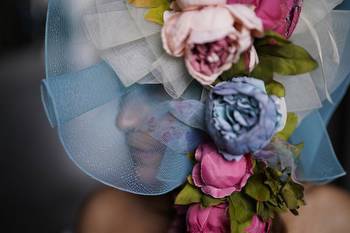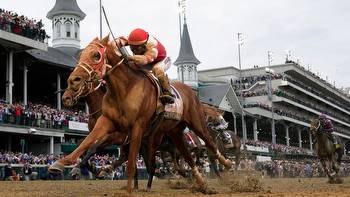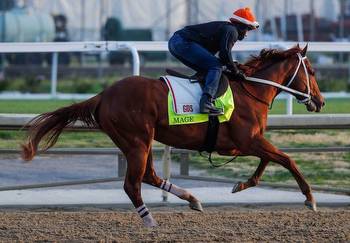Mage's Kentucky Derby win: A salve for horse racing's wounds

LOUISVILLE -- At nineteen minutes past seven on Saturday evening, under pale clouds with a thick spring wind brushing past, two men in green golf shirts and khaki trucker hats tossed a blanket of roses across the withers of Mage, a three-year-old chestnut colt who had won the 149th Kentucky Derby at 15-1 odds in just the fourth start of his life. The garland weighs about 40 pounds, more than one might expect from a strip of ceremonial blossoms, but that’s just the flowers, and doesn’t include the weight of racing’s reputation, which comes tethered to this moment every year on the first Saturday in May. The Derby usually proves itself a sturdy foundation upon which a sport wobbles and remains (mostly) upright, regardless of the weight. This year it was an especially heavy lift.
As Mage circled the Downs and the 1 ¼ miles of the Derby, voices rising higher from the crowd of 150,335, with that cacophonous and indecipherable desperation that can only come from a game with 20 – check that, 18 – teams, building to a withering crescendo at the wire, and then startlingly dissipating into a buzz, he ran in the vapor trail of 10 days not quite like any run-up in the recent – or any -- history of the Derby. Before Derby Day, the numbers were these: Five horses dead at Churchill Downs, including one Derby entrant, in the six days from April 27 – May 2; five horses scratched from the body of the Derby field, the most since 1936; one trainer suspended and another disregarded, a member of the Hall of Fame, no less.
Sadly, it didn’t stop there: Two more horses died on Saturday, in Derby undercard races. Chloe’s Dream, a 3-year-old gelding making her second career start; and Freezing Point, a 3-year old roan colt. Both were euthanized after suffering foreleg injuries.
Writ much larger, it had been a week in which racing either drifted ever closer to irrelevance and possibly extinction, or just maybe took steps to save itself. A week in which Churchill Downs and the Kentucky Horse Racing Commission took aggressive measures to potentially reduce the possibility of further tragedy (and also, not coincidentally, for Churchill to protect its bottom line, because all major sports are businesses, first).
Perhaps those measures helped in some way, or perhaps we won’t know for months or years, because the reclamation of racing is a long game. But as darkness stretched across Churchill Saturday night, it was the reliable – and yet ever more fragile – restorative power of racing itself, and against much longer odds than 15-1, that breathed life into a battered game. It was a talented but lightly raced horse that stood beneath the blanket of roses, a melting pot of Kentucky, Venezuela and Florida, and other places, too; of a trainer with little Derby experience and a jockey with mountains of it. Of a stretch run into history.
It was a bouncing, swaying crowd of owners and micro-owners surrounding Mage’s 66-year-old Venezuelan trainer, Gustavo Delgado, who came to the United States nine years ago, chanting deliriously: Gu-STA-vo! Gu-STA-vo! Gu-STA-vo! And Delgado, rocking an audacious white suit, but humbled by the moment, saying, “I’m very happy, very happy… for Mage, for my owners, for my family…” and then blowing a kiss in their direction, before adding, “I love you,” and then, as if delighted and embarrassed in one sentence, “My apologies… because my English is not very good.” (There is a vital Venezuelan chapter in Derby history; in 1971, Canonero II came to the Derby from Venezuela and won, and then won the Preakness, and fell short in the Belmont in front of a massive crowd. Delgado’s assistant is his son, Gustavo Delgado, Jr., who said, “My dad grew up in the generation that was talking about that. He always felt like he could accomplish that.”)
(One other piece of history: 50 years on from Secretariat’s Triple Crown, Mage was stabled in the same barn as Big Red. A slice of good karma.)
It was 45-year-old jockey Javier Castellano, also born in Venezuela, one of the most respected riders in the U.S. for more than two decades, with a leg up on 2004 Breeders’ Cup Classic winner Ghostzapper and 2006 Preakness winner Bernardini, finally winning the Derby in his 16th try, never having finished better than third, and with a professional and patient ride that might have unnerved a rider with fewer miles on his saddle. “Sometimes you feel embarrassed a little bit when you’ve been trying so many times, and you don’t see the results,” he said. “Sometimes you go down a little bit. But I never give up.” His children surrounded him as he spoke. “It’s amazing when somebody believes in you and they trust you, and they put it in your hand…”
It was co-owner and bloodstock agent Ramiro Restrepo, weary of fighting for draft picks against the giant hedge fund and private equity syndicates that have increasingly come to dominate the high end of the thoroughbred game, reaching to spend $290,000 – at Delgado’s urging: “Gustavo took out his whip and cracked me two times and said, ‘Let’s go, don’t stop bidding!’ – last May for an unraced two-year-old. We went up to $290,000,” Restrepo said, “Which in the real world is a lot of money, but which in horse racing, it’s just, it’s a respectable number, but it’s by no means a lot of money.”
And this: “This is a game where so many successful people are buying bulk, and I feel like they have unlimited bullets, and we have a musket.”
And it was another co-owner, Sam Herzberg, who owns South Florida-based Sterling Racing with his wife and another couple, and who 10 years ago had a respectable – if not sensational – Derby horse named Black Onyx, only to see him scratched on the day before the Derby when a bone chip was discovered in his ankle. “To come back here 10 years later and not only get in the Derby, but win the Derby? I don’t know what to say. It’s magical.”
No less magical that Mage brought joy to the Downs through brutal headwinds.
The last moment first: Early Saturday morning, trainer Todd Pletcher sent Derby favorite Forte, winner of two major prep races and the Derby favorite since he won the Breeders’ Cup Juvenile last fall, from his stall in Barn 39 on the Churchill backside to the main track for a light gallop. Pletcher, 55, has eight Eclipse Awards as the nation’s top trainer (including last year’s), six Triple Crown races (two Derbys and four Belmonts, including last year’s), and was elected to the Hall of Fame in 2021.
Minutes after the workout, Nick Smith, chief veterinarian for the Kentucky Horse Racing Commission, asked that Forte be jogged on the asphalt surface outside the barn. After watching two passes, Smith consulted with Pletcher and Forte co-owner Mike Repole and scratched Forte from the Derby. It was the second such 11th-hour Derby disappointment for Repole: In 2011, favored Uncle Mo became ill and was scratched (by Pletcher) on the day before the Derby. This time, Repole waffled between acceptance and barely contained anger. “They said he was ‘off a nick’ [in the right foreleg],” said Repole. “We had three of the best vets look at him. I think [Smith] is being overly cautious. I understand the safety of the horse is the most important thing. I’m just concerned about the systems we have… scratching this horse under these bright lights…”
But there is one reading of the situation where that is exactly the point.
Frist, quickly relive the 10 days leading to the Derby. During a morning work on Thursday, April 27, Derby entrant Wild On Ice, winner of the Sunland Derby, was injured in a work and later euthanized. Two days later, on Saturday, April 29, a week before the Derby, 4-year-old filly Parents Pride (not a Derby horse) collapsed and died in the eighth race; three days after that, 5-year-old gelding Chasing Artie (also not a Derby horse) was eased up and also died suddenly. Both Parents Pride and Chasing Artie were trained by Saffie Joseph, Jr. There were two other deaths, one a breakdown and a horse that flipped and broke its neck in the paddock. Despite a lack of connective tissue, the deaths felt like a plague. Animal rights groups circled.
Longer term, racing has been wrestling with the issue of horse deaths – on humane and economic levels – for many years, rising to crisis level with the deaths of 30 horses at Santa Anita in the winter and spring of 2019 and the subsequent death of Mongolian Groom in the Breeders’ Cup Classic, also at Santa Anita in early November of ’19. (California has placed a renewed emphasis of equine safety in recent years and an accompanying drop in fatalities; Horse deaths have steadily declined in the U.S. since 2012, from near 2.00 per 1,000 starts to 1.25 last year, improvements that are routinely overshadowed by high-profile deaths).
It was against these backdrops – distant and recent – that Churchill Downs suspended Joseph on Thursday, two days before the Derby, and ordered his Derby horse, Wood Memorial winner Lord Miles, scratched from the Derby. Hours before, Joseph had given a rambling interview to four journalists, whipsawing from the inevitability of death to a defense of the care given horses in his and other barns. “I would have no problem coming back as a horse in my next life,” which is poignant and all, but you wonder if he’d want himself as a trainer, given the recent outcomes.
Churchill’s decision to suspend Joseph came without the disclosure of hard evidence, although sudden death in one horse is rare, and two in four days almost unimaginable without nefarious actions. It was a very aggressive play, in line with the company’s 2021 decision to disqualify Medina Spirit from his Derby win after a banned substance was found in his system and to ban trainer Bob Baffert from the Derby for two years.
Three other scratches were lumped into the Derby-in-chaos narrative, but each was its own case: Santa Anita Derby winner Practical Move and third-place finisher Skinner, each with a fever; and Continuar, for training poorly. Nevertheless, every defection fed the story. Does anybody want to run this Derby?
It turns out Mage wanted to run. After writing the check to buy him for that $290,000 price last May, Restrepo, Delgado, and Delgado’s son turned Mage out to rest for two months on a Kentucky farm and didn’t rush him to the races. “Gustavo is a patient trainer,” said Restrepo. “We never say to ourselves ‘We’re going to focus on Saratoga in August or Keeneland in October.’” Restrepo also reduced his risk. At the start he co-owned Mage with Delgado; he then brought in Herzberg and Commonwealth Racing, a partnership group that specializes in selling micro-shares, and has more than 400 “owners” with a piece of Mage.
He did not race as a 2-year-old, which means that he joins 2018 Triple Crown winner Justify as the only two horses to win the Kentucky Derby while having not raced at age two since Apollo in 1882. Mage won his first race in January, and then Castellano rode him to a fourth-place finish in the March 23 Fountain of Youth Stakes. More promising was a second-place finish behind Forte in the April 1 Florida Derby, where Mage moved late and held the lead into the deep stretch before getting overhauled by Forte. (Another reason why the Derby result will sting for Repole and Pletcher).
On Saturday, Mage broke very slowly from the gate. Castellano settled, and then maneuvered Mage to the rail, saving ground, a veteran move. “The horse, he didn’t break,” said Castellano. “I didn’t panic. We have plan A, B, C, D. I knew there was a lot of speed in the race. Take your time, enjoy the ride.”
At the front of the race, the Brad Cox-trained Verifying and Pletcher’s Kingsbarns buzzed through quick early fractions of 22.35 seconds for the first quarter-mile, 45.73 seconds for the half-mile and 1:10.11 for three-quarters; not ridiculous, but fast. “I knew there was speed in the race,” said Castellano. “A lot of horses running the same way.”
Restrepo watched, ever the bloodstock man, doing calculations. “I saw 22, 45, one-ten,” said Restrepo. “Those are fast fractions. The horse was just finding his own rhythm.” Up the backstretch, Castellano was sitting chilly in 16th place and gradually began picking off horses. Through the far turn, Mage carried him inside then out, up to sixth place. He slingshotted off the turn, five wide; Castellano leaned over Mage’s neck and moved his hands. One smack of the whip and only one. Up front, Two Phil’s took the lead. Inside the eighth pole, beneath the ancient twin spires, Mage collared him, and drew clear by a length.
It was the first Saturday in May, and so the Downs shook again, not just in celebration, but in relief.
It was not an answer to every difficult question in the sport, but a reminder of what good it can bring.
Not sadness ongoing, but joy in the moment.
Not a cure, but a salve.
Tim Layden is writer-at-large for NBC Sports. He was previously a senior writer at Sports Illustrated for 25 years.
